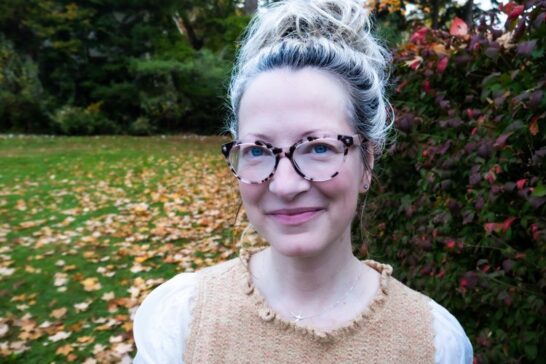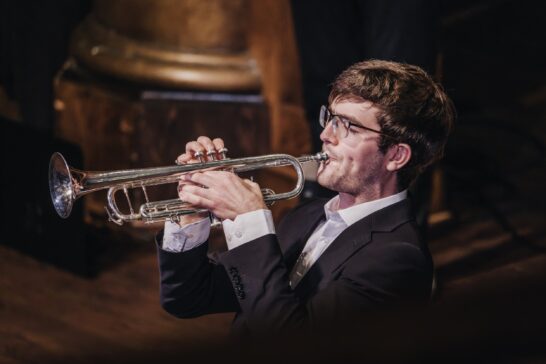Meet the Student: Q&A with Conductor Micah Gleason (Part II)

Micah Gleason, from Chapel Hill, North Carolina, entered the Curtis Institute of Music in 2022, and will be conducting the Curtis Symphony Orchestra‘s performance of Julia Perry’s Study for Orchestra on Saturday, April 15, with “Perry, Schumann, and Mahler.” As a conducting fellow, she works closely with Curtis mentor conductor Yannick Nézet-Séguin, music director of the Philadelphia Orchestra and the Metropolitan Opera. All students at Curtis receive merit-based, full-tuition scholarships, and Ms. Gleason is the Rita E. Hauser Conducting Fellow.
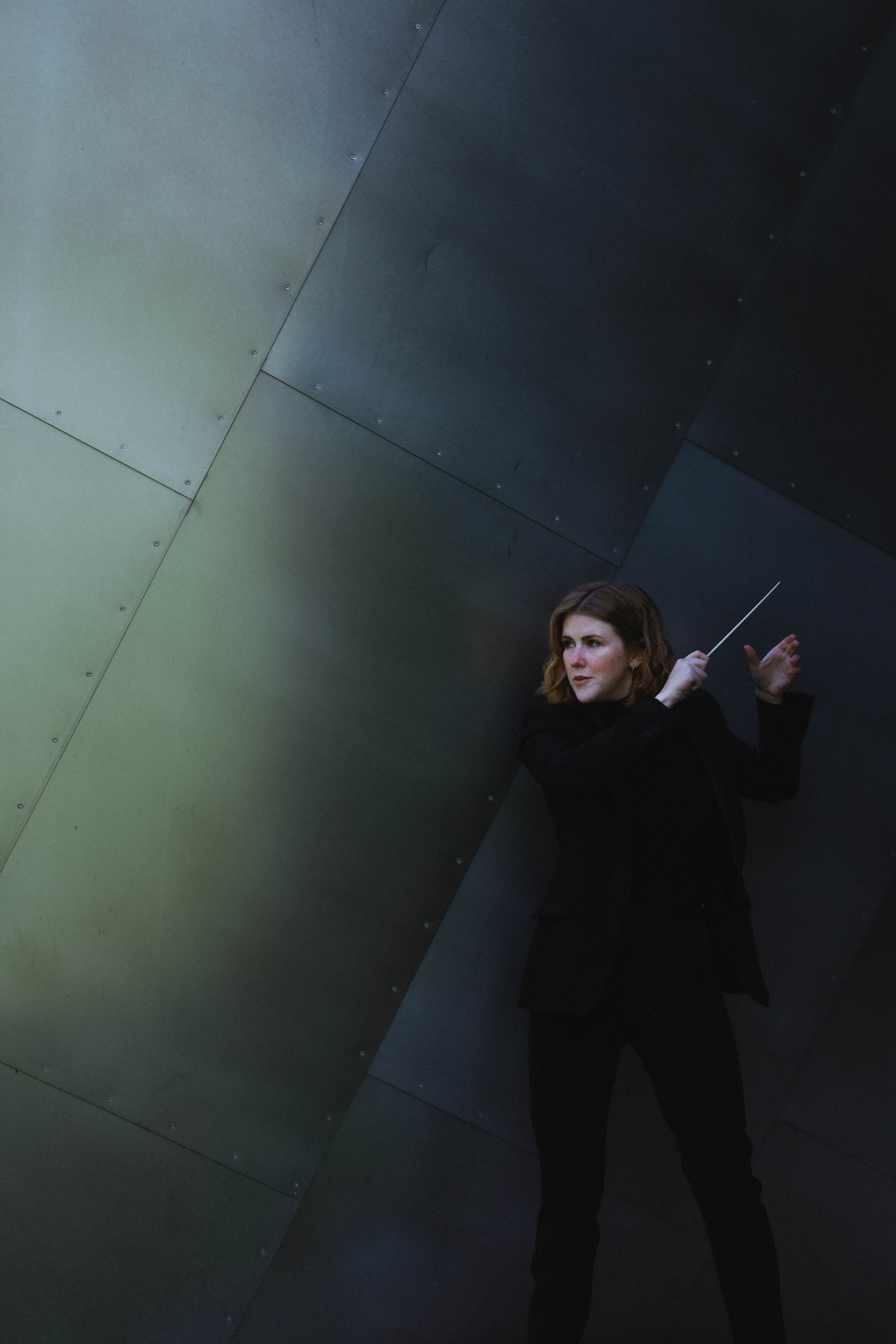 As a conductor and a mezzo-soprano, you are forging a unique career with few prominent contemporaries, although Canadian soprano Barbara Hannigan and contralto Nathalie Stutzmann come to mind. Have you performed a work where you are both conducting and singing, and what are the opera arias, art songs, and chamber music repertoire that speak to you as an artist?
As a conductor and a mezzo-soprano, you are forging a unique career with few prominent contemporaries, although Canadian soprano Barbara Hannigan and contralto Nathalie Stutzmann come to mind. Have you performed a work where you are both conducting and singing, and what are the opera arias, art songs, and chamber music repertoire that speak to you as an artist?
Barbara Hannigan and Nathlaie Stutzmann are both huge inspirations for me as you can imagine, particularly Nathalie as we sing much of the same repertoire. I was resistant to conduct and sing at the same time for a while (it seemed frankly really hard, I didn’t want it to feel like a gimmick, etc.—plus, Barbara doing it is unreal—she is singing wildly difficult repertoire, she is acting for her life—it’s amazing! But felt like huge shoes to fill since she’s the obvious and really only comparison to draw), but I sort of stumbled into it a few summers ago when I was a conducting fellow at Eastern Music Festival. We were working on Mahler’s fourth symphony, and as the fourth movement revolves around a vocal soloist and there were no singers at this festival, there was talk of skipping it. The solo in that symphony is really for soprano (I am more of a Mahler 2 or 3 girl myself), but it seemed a shame to skip it so I volunteered to sing it for my colleagues, and ended up singing it while conducting it myself as well. It felt wonderfully organic, and I definitely wanted to do it again. Since then I’ve done it with mostly larger chamber works, like Ravel’s Trois Poèmes de Stephane Mallarmé, but I have a few larger orchestral bucket list items now, including Peter Lieberson’s Neruda Songs and Manuel de Falla’s Three Cornered Hat.
One last cosmically important thing to mention is that myself, Barbara Hannigan, and Nathlaie Stutzmann are all Tauruses—our birthdays are May 6, 7, and 8.
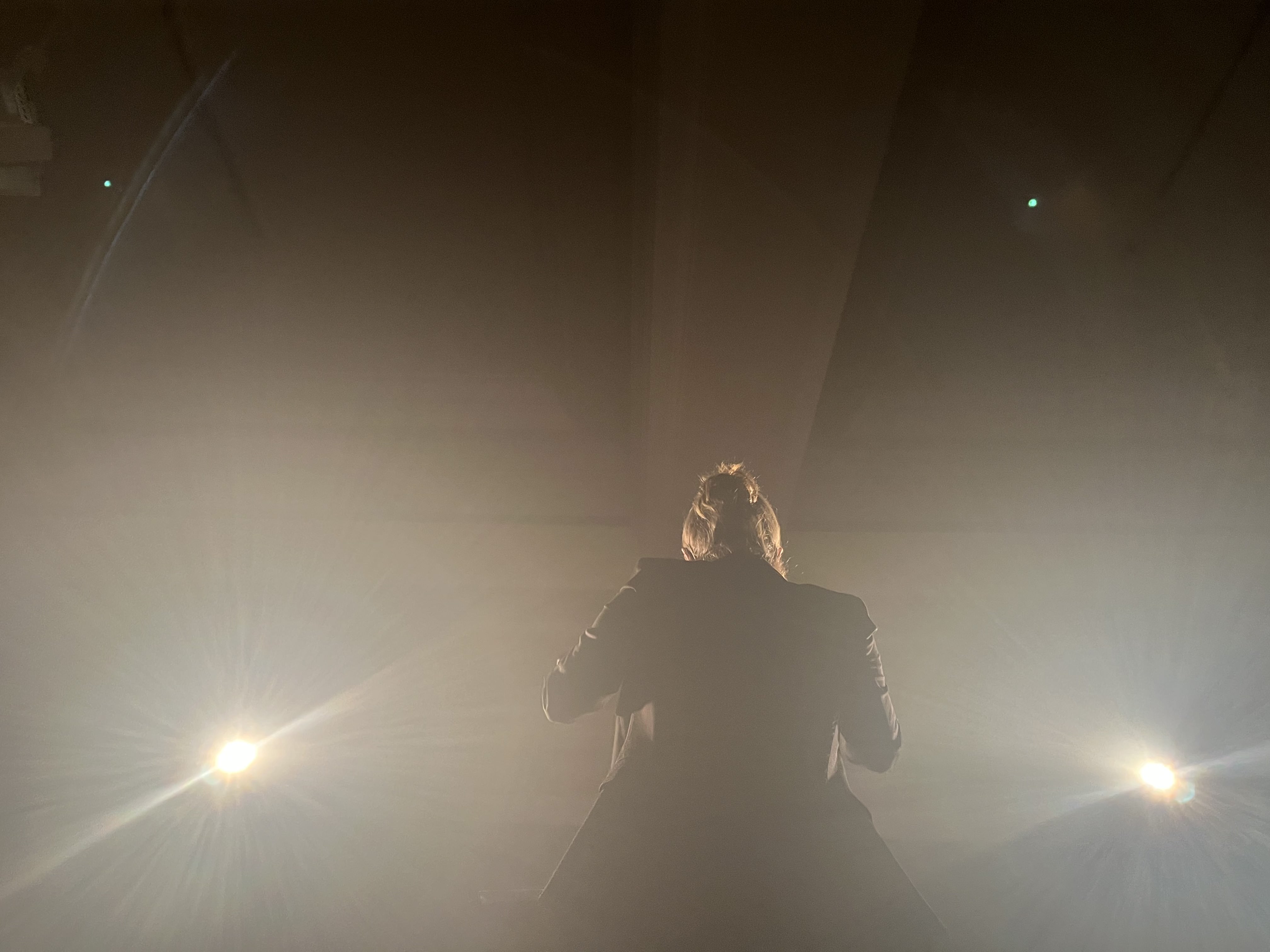 What has been one of your most memorable experiences here at Curtis thus far, and where do you see yourself in the years after graduation?
What has been one of your most memorable experiences here at Curtis thus far, and where do you see yourself in the years after graduation?
Any and all time spent with Yannick has been unforgettable—he is truly the consummate artist, wonderful and generous teacher and person. I am in awe that I get to work with him regularly and am always touched by the very careful attention he pays to myself and Jacob, as well as each part of the orchestra.
As for after graduation—I’m not sure! In general when setting career goals, I try to stay very open—my path to Curtis was a winding one, and my path after Curtis surely will be as well, and I honestly love it that way! My general goal is to have an orchestra or opera company (ensemble) that I consider a home base/community, and then freelance as a singer and conductor from there, collaborating with friends new and old. I am trying to constantly reaffirm the type of person/musician I want to be, the type of people I want to work with, what kinds of projects I want to do and why—but I have no idea exactly how that will work! If I get to spend my days in the company of other musicians who do what they do with creativity and integrity, I will be so happy and fulfilled!
Can you tell us more about Loam?
 Would LOVE to! Loam is a musical partnership I formed in grad school with my dear friend and esteemed colleague Joanne Evans, who is a mezzo-soprano like myself. We started conceiving a project together that involved a loose narrative/reflection, chamber music, something that was staged, something that felt immediate, something interdisciplinary, something very personal…and thus our first baby was born, The Fragile Femme, a semi-immersive chamber music and dance performance exploring femmephobia and feminine experiences across gender, time, and place. Joanne and I conceived, programmed, and performed in the concert, which included three new commissions. My wonderful friend and brilliant director George Miller joined and immediately electrified the entire creative process, and brought on choreographer Matilda Sakamoto and dancers Becca Hoback and Kevin Zambrano who were unreal to work with – total geniuses and incredibly intentional in everything that they do. This team, along with friends from The Orchestra Now and our collaborative pianist Elias Dagher brought The Fragile Femme to life, which I can say is to this day the most rewarding artistic experience I’ve had. Joanne and I knew early on in this process that we were a great team and wanted to create ways to tell more stories that involve singing and poetry as well as the intimacy of chamber music. We love commissioning new works as well as finding existing works that can work together to create a new experience, and love getting to work with so many brilliant collaborators who bring their own thoughtful perspective to what we create together.
Would LOVE to! Loam is a musical partnership I formed in grad school with my dear friend and esteemed colleague Joanne Evans, who is a mezzo-soprano like myself. We started conceiving a project together that involved a loose narrative/reflection, chamber music, something that was staged, something that felt immediate, something interdisciplinary, something very personal…and thus our first baby was born, The Fragile Femme, a semi-immersive chamber music and dance performance exploring femmephobia and feminine experiences across gender, time, and place. Joanne and I conceived, programmed, and performed in the concert, which included three new commissions. My wonderful friend and brilliant director George Miller joined and immediately electrified the entire creative process, and brought on choreographer Matilda Sakamoto and dancers Becca Hoback and Kevin Zambrano who were unreal to work with – total geniuses and incredibly intentional in everything that they do. This team, along with friends from The Orchestra Now and our collaborative pianist Elias Dagher brought The Fragile Femme to life, which I can say is to this day the most rewarding artistic experience I’ve had. Joanne and I knew early on in this process that we were a great team and wanted to create ways to tell more stories that involve singing and poetry as well as the intimacy of chamber music. We love commissioning new works as well as finding existing works that can work together to create a new experience, and love getting to work with so many brilliant collaborators who bring their own thoughtful perspective to what we create together.
We have two current big project ideas in the works, with collaborators who really excite us – we are now in the process of searching for funding for these projects, applying for fiscal sponsorship, as well as finding the time to all be together and make them happen – never enough time it seems, but it’s important to make time for the projects that matter! More information can be found about Loam at micahgleason.com/loam.
 As your website states, how do you intend to “disrupt the stasis and comfort of the concert hall” with your work now and in the future?
As your website states, how do you intend to “disrupt the stasis and comfort of the concert hall” with your work now and in the future?
Great question! To me this means many things. Literally, it could mean disrupting the space itself—taking music traditionally played in a concert hall elsewhere: site-specific work, music in public spaces, things like that. It could mean disrupting the stasis of a concert hall by programming music that has never been heard in that space before, or inviting performers or collaborators into that space that have never performed there before. Disrupting the comfort, meaning exploring challenging themes through music and art, meaning inviting audiences that wouldn’t normally overlap into a space to experience art together, meaning subverting expectations in some way through the program itself, or the presentation of the material. I certainly love the idea of conducting great canon repertoire with a top-notch orchestra in a beautiful hall as much as the next person—but to me, what this ethos means is that I try to check in regularly and make sure I am asking myself and my collaborators why we are doing what we are doing, why now and why here, for whom, etc. These are considerations that I think often fall to the wayside in the classical music world, in pursuit of “musical excellence” and “high art”—resulting in an art form that resembles a museum more than a living breathing response to culture, time, and place.
Throughout history, women in classical music have been systematically silenced. Gender inequity is still ubiquitous, and on the podium, female conductors like Marin Alsop, Jeri Lynne Johnson, Mirga Gražinytė-Tyla, Alondra de la Parra, and Xian Zhang have paved the way for progress. Still, only a handful of women have come to occupy leading positions in major orchestras. With Alsop’s Taki Alsop Conducting Fellowship, the Breaking Barriers Festival, and the Dallas Opera’s Hart Institute for Women Composers addressing the gender imbalance head-on, from your perspective, do you see significant progress being made in the industry?
I certainly do! I think initiatives like this are desperately important, and I personally do really see the landscape changing, slowly but surely. I no longer necessarily assume when I show up to an event with multiple conductors that I will be the only one who isn’t a man (which certainly used to be my assumption), and people don’t seem as surprised as they used to be even two or three years ago when I said I was studying conducting. However, almost every single time I conduct these days, I still get at least one person afterwards telling me they’ve never seen a woman conductor before; I get far more comments on my clothes and appearance than my male colleagues, and I very often hear qualifying statements about myself and my female colleagues that feel honestly pretty gross (even well-intentioned ones, along the lines of “You know, she won the job because she was the best—not just because she’s a woman!”).
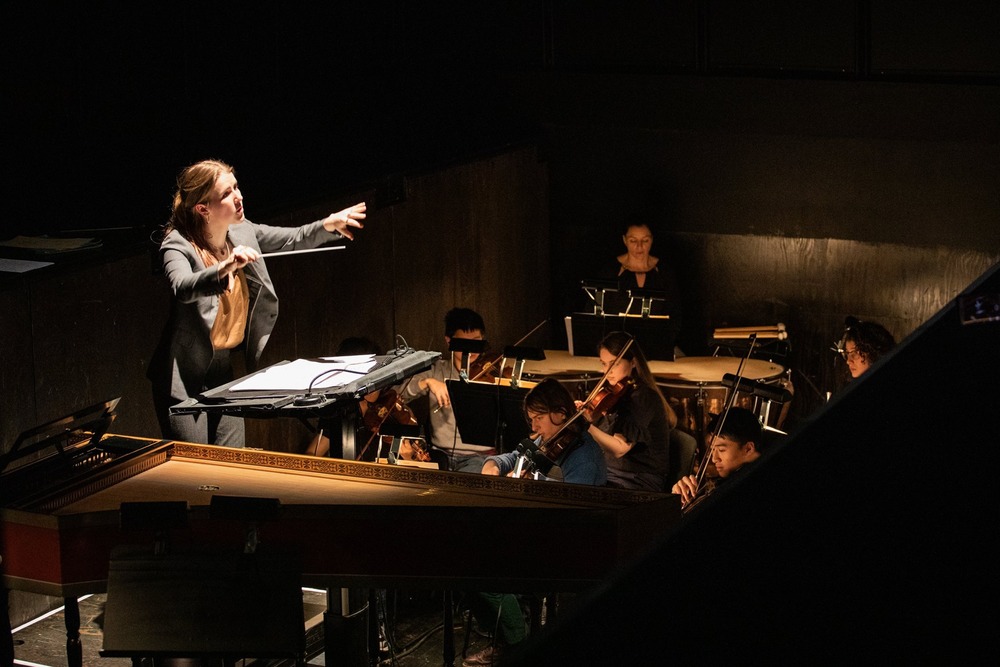 Something interesting that I find comes up more often these days is less the expectation that we will be male, and more this expectation that we will act male—and I use “male” in this instance less to describe someone’s gender itself but rather to describe qualities commonly associated with maleness. Conductors for a long time have been expected to lead and behave in a very specifically male way—domineering, assertive, aggressive, unyielding. In many fields, I think we are trying to redefine what good leadership means, how to galvanize a group of people, and how to achieve the best results—which often means rejecting long-held beliefs about hierarchies, and establishing mutual trust and appreciation. Something I think all conductors should interrogate, but non-male conductors are forced to interrogate constantly, is how the way we are expected to be in society is perhaps at odds with the way we are expected to be on the podium; which behavioral expectations serve us and serve the players and which don’t, and how to balance being the person we want to be in the world with being the best conductor we can be. Is that the same thing? I think yes, but it is a tricky dynamic to navigate, especially in such a tradition-steeped industry.
Something interesting that I find comes up more often these days is less the expectation that we will be male, and more this expectation that we will act male—and I use “male” in this instance less to describe someone’s gender itself but rather to describe qualities commonly associated with maleness. Conductors for a long time have been expected to lead and behave in a very specifically male way—domineering, assertive, aggressive, unyielding. In many fields, I think we are trying to redefine what good leadership means, how to galvanize a group of people, and how to achieve the best results—which often means rejecting long-held beliefs about hierarchies, and establishing mutual trust and appreciation. Something I think all conductors should interrogate, but non-male conductors are forced to interrogate constantly, is how the way we are expected to be in society is perhaps at odds with the way we are expected to be on the podium; which behavioral expectations serve us and serve the players and which don’t, and how to balance being the person we want to be in the world with being the best conductor we can be. Is that the same thing? I think yes, but it is a tricky dynamic to navigate, especially in such a tradition-steeped industry.
This is one of the many reasons I so deeply admire Yannick, who I think challenges himself to lead in a totally new, creative, positive, and inviting way. His leadership is in a way distinctly un-male to me, in that it inspires people forward using joy and encouragement, rather than fear. And, in part because of this, he truly is the best of the best!
Visit Micah Gleason’s official website HERE.
Interview with Micah Gleason by Ryan Scott Lathan.
CURTIS SYMPHONY ORCHESTRA
Perry, Schumann, and Mahler
Spring Gala 2023
Saturday, April 15, 2023, at 3 p.m.
Verizon Hall, Kimmel Center, Broad and Spruce Streets, Philadelphia
Osmo Vänskä, conductor
Micah Gleason, Rita E. Hauser Conducting Fellow
Amy Yang (ʼ06), piano
PROGRAM
| JULIA PERRY | Study for Orchestra | |
| ROBERT SCHUMANN | Piano Concerto in A minor, Op. 54 | |
| GUSTAV MAHLER | Symphony No. 1 in D major (“Titan”) |
TICKETS
Single tickets: $19–55, sold by the Kimmel Center Box Office at KimmelCenter.org, or (215) 893-1999.
To secure seats for the Spring Gala 2023, visit www.curtis.edu/event/spring-gala-2023
Orchestral concerts are supported by the Jack Wolgin Curtis Orchestral Concerts Endowment Fund.
Guest conductor appearances for each Curtis Symphony Orchestra performance are made possible by
the Rita E. and Gustave M. Hauser Chair in Conducting Studies.
Photos 1-5 of Micah Gleason courtesy of Micah Gleason Photography. Photo 6 by Christopher Kayden of Kayden Imaging.
